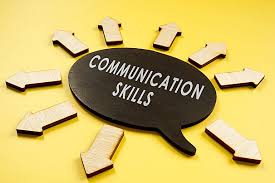Developing Effective Communication Skills: A Guide (Communities - Free Stuff)

CANetAds > Communities > Free Stuff
Item ID 3948045 in Category: Communities - Free Stuff
Developing Effective Communication Skills: A Guide | |
Communication is the cornerstone of human interaction, enabling us to share ideas, build relationships, and navigate the complexities of life. Effective communication involves not only expressing our thoughts clearly but also actively listening and understanding others. In today's interconnected world, strong communication skills are essential for success in both personal and professional endeavors. The Importance of Communication Communication plays a vital role in various aspects of our lives: Relationships: Open and honest communication fosters strong bonds with friends, family, and loved ones. It helps us understand each other's perspectives, resolve conflicts, and build trust. Career Success: Effective communication skills are highly valued in the workplace. They enable us to collaborate effectively with colleagues, present ideas persuasively, and build strong professional relationships. Personal Growth: Communication allows us to express our thoughts and feelings, learn from others, and develop a deeper understanding of ourselves and the world around us. Key Components of Effective Communication Effective communication involves several key components: Active Listening: Active listening involves paying full attention to the speaker, understanding their message, and responding thoughtfully. It requires suspending judgment, maintaining eye contact, and providing verbal and nonverbal cues to show that you are engaged. Clear and Concise Expression: Expressing your thoughts clearly and concisely is essential for effective communication. Avoid jargon or technical terms that may confuse your audience. Use simple language and structure your message in a logical way. Nonverbal Communication: Nonverbal communication, such as body language, facial expressions, and tone of voice, can significantly impact how your message is perceived. Ensure that your nonverbal cues are consistent with your verbal message. Empathy: Empathy is the ability to understand and share the feelings of others. By putting yourself in someone else's shoes, you can communicate more effectively and build stronger relationships. Assertiveness: Assertiveness is the ability to express your thoughts and feelings in a direct, honest, and respectful manner. It involves standing up for your rights while considering the needs of others. Tips for Improving Communication Skills Here are some practical tips for improving your communication skills: Practice Active Listening: Make a conscious effort to pay attention to the speaker and avoid interrupting. Ask clarifying questions to ensure you understand their message. Be Mindful of Nonverbal Cues: Pay attention to your own body language and the nonverbal cues of others. Ensure that your nonverbal communication is consistent with your verbal message. Practice Empathy: Try to see things from the other person's perspective. Put yourself in their shoes and consider how they might be feeling. Seek Feedback: Ask trusted friends, family, or colleagues for feedback on your communication skills. Be open to constructive criticism and use it to improve. Take Communication Courses: Consider taking a communication course or workshop to learn new skills and techniques. Conclusion Effective communication is a valuable skill that can benefit you in all areas of your life. By actively listening, expressing yourself clearly, and being mindful of nonverbal cues, you can build stronger relationships, achieve your goals, and navigate the complexities of the world around you.  | |
| Related Link: Click here to visit item owner's website (2 hits) | |
| Target Prov.: All Provinces Target City : All Cities Last Update : Sep 16, 2024 1:41 PM Number of Views: 65 | Item Owner : mbhazrat Contact Email: (None) Contact Phone: (None) |
| Friendly reminder: Click here to read some tips. | |
CANetAds > Communities > Free Stuff
© 2025 CANetAds.com
USNetAds.com | GetJob.us | UKAdsList.com | AUNetAds.com | INNetAds.com | CNNetAds.com | Hot-Web-Ads.com | USAOnlineClassifieds.com
2025-03-30 (0.677 sec)